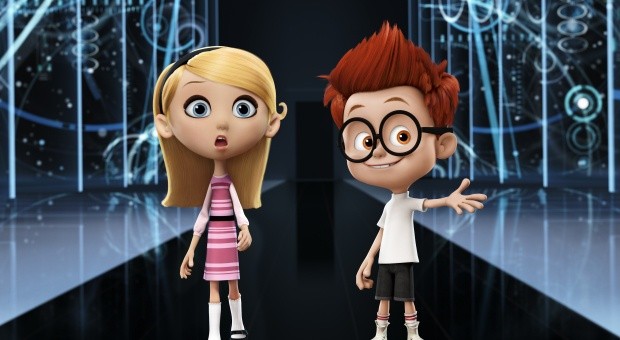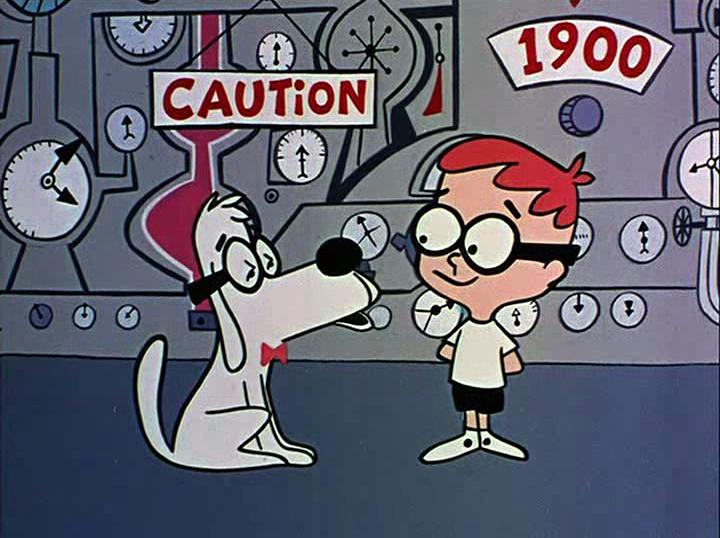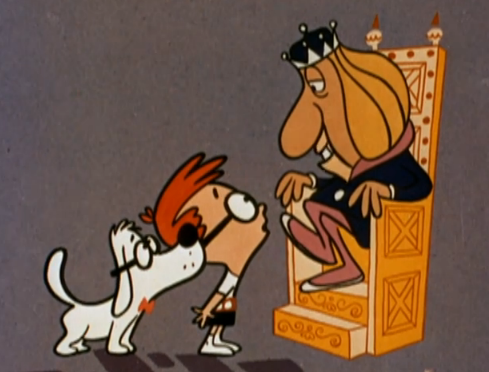 Tim here. This week, the latest attempt to kick off a new franchise through the magic of misplaced brand recognition finds DreamWorks Animation hoping to reverse their crawling economic slump of the past couple of years with Mr. Peabody & Sherman. Seriously, what nightmarishly mis-aimed board meeting thought that one up? Giving a coat of CGI paint to a ‘60s TV cartoon beloved in such a way that nobody within the target audience has ever heard of it, and nobody with pre-existing affection for it is going to have anything but open contempt for the basic idea. If they were that hell-bent on “talking animal and kid travel through time”, they could have just, I don’t know, made it about a supercilious iguana and a little girl, and saved themselves the cost of getting the rights.
Tim here. This week, the latest attempt to kick off a new franchise through the magic of misplaced brand recognition finds DreamWorks Animation hoping to reverse their crawling economic slump of the past couple of years with Mr. Peabody & Sherman. Seriously, what nightmarishly mis-aimed board meeting thought that one up? Giving a coat of CGI paint to a ‘60s TV cartoon beloved in such a way that nobody within the target audience has ever heard of it, and nobody with pre-existing affection for it is going to have anything but open contempt for the basic idea. If they were that hell-bent on “talking animal and kid travel through time”, they could have just, I don’t know, made it about a supercilious iguana and a little girl, and saved themselves the cost of getting the rights.
But here we are, with the latest in a long line of remakes that simultaneously gloss up, flatten, and embalm an old classic that needs none of those thing. I assume nobody can afford to still be upset over that sort of thing, or else how would you be able to get up in the morning?

Anyway, I would be fully content to ignore the existence of the remake altogether, but it makes for a convenient excuse to spread some love the way of the original Peabody & Sherman cartoon. To give it its right name, Peabody’s Improbable History, of which 91 episodes were produced between 1959 and 1963, and aired as one of the regular segments of the Rocky & Bullwinkle series made by Jay Ward Productions. These days, Ward’s output – also including Fractured Fairy Tales and Dudley Do-Right – is primarily remembered with cultish nostalgia by people who saw it on TV, either when it was new, or during its frequent appearances in syndication through the years. But we are a very enthusiastic cult, and the appeal of the supercilious dog genius Mr. Peabody and his dimly enthusiastic human boy Sherman is sturdy enough that I think it’s not just nostalgia that makes the series hold up after more than half a century.

The DNA that unites all of the Jay Ward mini-franchises is a certain wry love of playing with language, and a fearless adoration of obviously feeble wordplay. The Peabody shorts probably took this to its extreme limit, with every 4-5 minutes short ending in a profoundly labored pun giving them the feeling of an incredibly convoluted set-up for a deliberately awful joke. Which, when you put it that way, sounds terrible. But it’s also kind of brilliant. The conceit of the shorts is basically a parody of children’s educational television: the genius dog Mr. Peabody and Sherman go back in time, meet a famous historical figure, figure out a way to get history on the right track. But the events depicted are so weirdly anachronistic as to make any real history lesson quite impossible; the climactic puns are thus nothing so much as a cheerful travesty of the “And now you’ve learned a lesson” button at the end of a more sincere piece of edutainment. For that is the other link between all the Ward cartoons: an enthusiastic, and surprisingly ahead-of-its-time conviction that good taste and deference to authority are to be actively shunned in a world where we’ve become more sophisticated than the media and culture we consume.
It’s not just snippy, piss-taking sarcasm, though that was more pronounced in the erudite, casually elitist-and-proud-of-it Peabody than any other character in Jay Ward’s stable. The random, anything-goes narratives and the art itself (like the rest of the studio’s output, limited animation so spare in its basic articulation that it resembles a comic strip brought, vaguely, to life, rather than actual fluid movement) have the on-the-fly improvisatory quality of a jazz performance, and while in a lot of ways we’ve caught up to the minimalism and simplicity of the Jay Ward house style, it’s very clearly of it’s time in this respect: the ‘50s vogue for clean, clutter-free art and design, from music to literature, is found in every frame, even as the sarcastic writing anticipates the ‘70s or ‘90s.

And at the same time, its quick digestibility, anachronistic sensibility, and over-educated reference to real figures mashed-up with absurd situations makes it a perfect fit for the comic sensibilities of modern pop culture, so perhaps bringing it up to date for a 2010s audience isn’t so far out of line. To an extent, all of the Rocky & Bullwinkle family of cartoons, and Peabody’s Improbable History not the least, are about showing off how clever the writer is for coming up with all of these random allusions and dexterous verbiage in the first place, and how clever the viewer is for grasping them. That’s one of the things the internet is best at, and it helps to keep the Peabody and Sherman shorts, in all their cunning, random glory, as fresh as they day they were made.
Below, one of the many Peabody’s Improbable History shorts available on YouTube; I picked it for having generally better video and audio than most, and for not cutting of the final pun like so many seem to do.